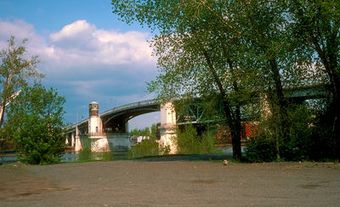Kirkland
Kirkland, Québec, City, pop 20 491 (2006c), 20 434 (2001c), inc 1961, became a parish municipality in 1855. Kirkland is located 26 km west of the city of Montréal, like most communities on the Island of Montréal, Kirkland has a long history. Mathieu Brunet was farming in the area as early as 1667.The town began with an edict by King Louis the XIV of France on 29 June 1711 which established the parish of St-Joachim de Pointe-Claire. A civil parish was established 11 years later on 3 March 1722. On 1 July 1845, the parish came under the control of the clergy.
In the 1950s Beaconsfield and the city of Pointe-Claire began to grow rapidly, and there were several attempts made to incorporate the parish in these urban communities. Area residents resisted and sought incorporation as a town on their own in 1961. The name Kirkland was chosen after the area member of the National Assembly, Dr. Charles A. Kirkland. The construction of the TRANS-CANADA HIGHWAY across the Island of Montréal in 1961 brought enormous changes to Kirkland. In 1968 the international drug company Merck-Frosst Canada Ltd moved to Kirkland to take advantage of its location on the highway. Other drug companies such as Burroughs Wellcome and Pfizer Canada followed, and Kirkland is now a centre for drug manufacturing and research.
Lantier House, a 200-year-old farmhouse located on Heritage Park, is the cultural centre of Kirkland. Renovated in 1979, it regularly hosts craft shows and art exhibits. Outdoor concerts occur at the various parks throughout the summer months. The Kirkland Chronicle is the regional newspaper.

 Share on Facebook
Share on Facebook Share on X
Share on X Share by Email
Share by Email Share on Google Classroom
Share on Google Classroom

